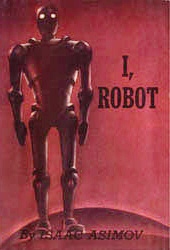 Now, look, let’s start with the three fundamental Rules of Robotics – the three rules that are built most deeply into a robot’s positronic brain.
Now, look, let’s start with the three fundamental Rules of Robotics – the three rules that are built most deeply into a robot’s positronic brain.
One, a robot may not injure a human being, or, through inaction, allow a human being to come to harm.
Two, a robot must obey the orders given it by human beings except where such orders would conflict with the First Law.
Three, a robot must protect its own existence as long as such protection does not conflict with the First or Second Laws.
These are Isaac Asimov’s easily recognizable and famous Three Laws of Robotics as laid out in his collection of short stories – I, Robot. For science fiction aficionados, these are easily identified and, most likely, committed to memory. Unfortunately for me, I just recently learned these laws. Sure, I’d heard them paraphrased many times and referenced in numerous books, but I never knew the true context in which they were used by Asimov. Now that I know the context, the rules are even more poignant and relevant in my mind.
I can’t believe it took me this long into my foray into science fiction readings to read I, Robot, especially given how many books I’ve read on artificial intelligence. Nearly every AI book makes reference to Asimov’s three laws of robotics, so it’s important, in my opinion, to understand how Asimov not only applied but also explored and tested the laws. Asimov didn’t take a static view of technology. He explored how technology evolved over time in order to demonstrate the laws’ relevance and importance. It was very interesting to see how the laws fared as AI advanced. It was one of many things I enjoyed about the book.
Furthermore, it’s amazing to me that the first version was published in 1951. Sure, there’s some quirkiness that dates the book, but by and large, the book is more relevant today than it was when it was written. At the time of writing, the AI presented in the book was not possible. Computers weren’t powerful enough to realize Asimov’s vision. Sixty-five years later, the story is not far fetched. In fact, we’re on the precipice of creating robots with the artificial intelligence capabilities which Asimov describes. I just hope that the creators of these machines will have read I, Robot. While the concepts exist in a work of fiction, the idea of having hard laws that constrain the behaviors of learning machines is absolutely critical. I would go so far as to making I, Robot required reading for people in the field of AI.
On top of the theoretical side, the book was very engaging. I found it very hard to put down, which makes me want to add more Asimov works to my reading list. Both the Foundation and Galactic Empire series look interesting, particularly since he apparently references his earlier works such as I, Robot.
Overall, I, Robot is a great book and a clear cut Must Read. As far as classic science fiction goes, it is right up there with books such as Brave New World and Neuromancer. In other words, it’s a classic in every sense of the word. If you’re a fan of science fiction, I, Robot needs to be at the top of your list to read. Ignore when it was published, because it doesn’t matter. I expect that it will be just as relevant 50 years from now as it’s today. I wouldn’t be surprised if one day, we look back at Asimov’s Three Laws of Robotics and wish that the creators of AI would have read I, Robot and applied the laws to their invention.
I’m very glad that I made the decision to read “classical” science fiction (inspired in large part on the recommendations of Brad Feld). Sure, occasionally, I’ll run into one that hasn’t stood the test of time. Those that have passed the test, however, have been amazing. It’s been well worth it, and it helps me appreciate the current state of the science fiction genre even more. It’s brought more realism into the writings of William Hertling, Hugh Howey, A.G. Riddle, Ramez Naam and Daniel Suarez. Their books may seem far fetched by today’s standard of technology, but something tells me these will be the authors and books that we will look back on 25 years (or more) from now and wonder how they foresaw the future.

Pingback: My 2016 reading list - Gregg Borodaty